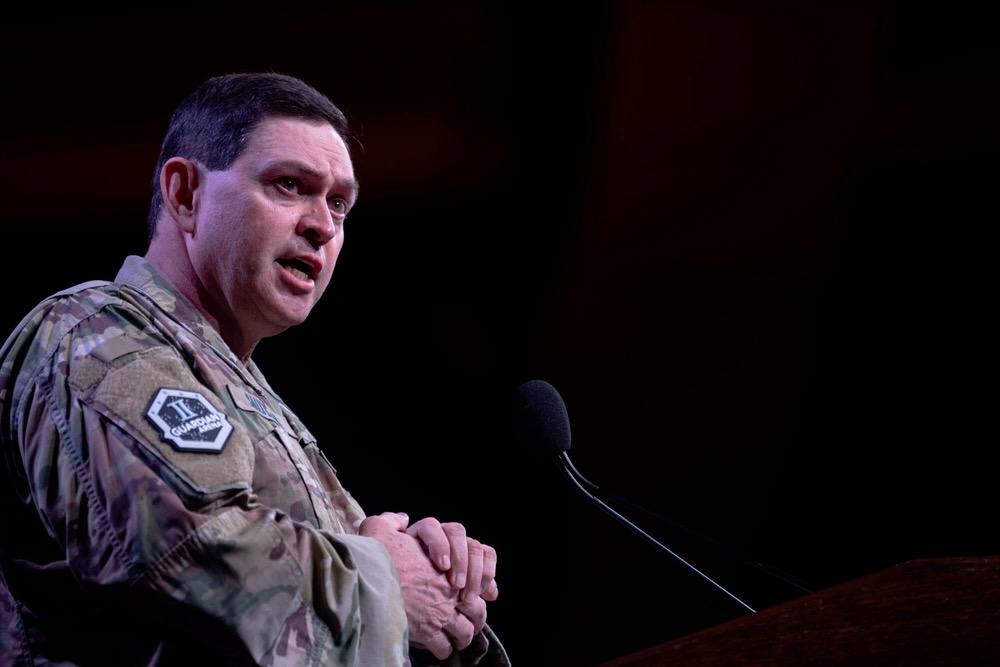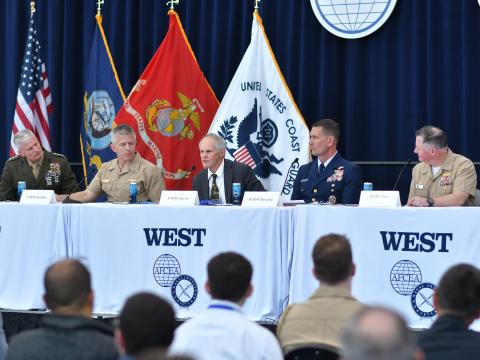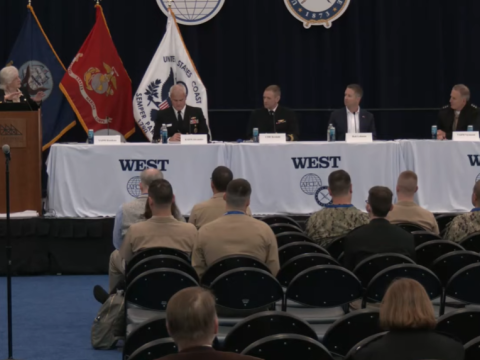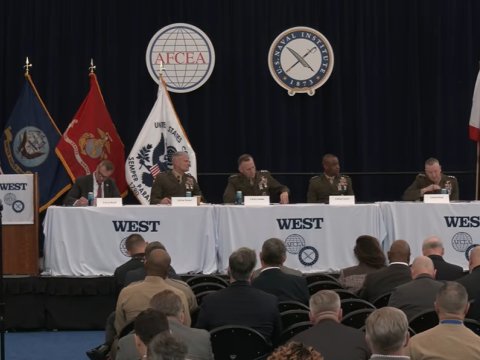CSO Highlights Guardians and Their Role in National Security
The U.S. Space Force is crucial to national security, and Guardians are needed to contribute to this mission, the leader of the service said on March 4, speaking at the Air and Space Forces Association’s (AFA's) Warfare Symposium held in Aurora, Colorado, and virtually this week.
Gen. Chance Saltzman, chief of Space Force Operations (CSO), also joined Chief Master Sergeant of the Space Force John Bentivegna in a press conference with members of the media, a recording of which was shared with SIGNAL Magazine.
In his speech to AFA, Saltzman aimed to boost the Guardians' spirits and relayed how he was advocating for the service to the U.S. Department of Defense (DoD) and Congress. And to the press, when asked how cuts will impact the service, Saltzman reiterated his role.
“I advocate for the need for the systems,” he said. “I advocate for how they're matched specifically against the threats. I advocate for the need to shift to a different mindset in terms of resilient architectures. I advocate for the fact that the service that we built under old Air Force base command structures is not the same service that we need now is contested environment, and so I do everything I can to minimize any considerations that pull money away.”
In addition to a hiring freeze, the DoD as a whole is being asked by the president to cut about 60,000 employees—roughly 5% to 8% of its workforce.
The impacts to an already lean Space Force could indeed provide challenges. The leaders would naturally follow the reduction orders, Saltzman emphasized. The CSO downplayed the effects, saying the force was used to being called on to perform with less.
“The orders are pretty clear, and we are going to follow those orders,” the CSO clarified. “Am I worried about it? I'm always worried about making sure we have the right workforce to do the missions that we have been given. We are a young service. We were growing, but the good news is, we were designed to be lean and agile. And so, if you start cutting back, we kind of know how that works. We have been doing the mission for five years with far less people than we have today.”
In addition, budget cuts or facing a continuous resolution (CR)—if Congress fails again to pass last year’s budget by March 14 that was due September 30, 2024—means the Space Force faces “really tight prioritization.”
When there are cuts, it is the leaders’ jobs to take the resources they are allotted and “build the best Space Force we can,” Saltzman said. That comes down to prioritization and finding the level of capabilities that can do the job at a minimum or extending the timeframe to implement technologies.
“The two things that I usually consider in terms of prioritization is, ‘Can I change the capacity of the capabilities that I'm delivering to save money?’” Saltzman explained to the media. “Do 32 satellites work instead of 48, or if I lower the fidelity, what do I get with less capacity? The other lever that we can pull is, ‘Can I stretch it out? Can I deliver over a longer term to save money in aggregate?' Time and capacity are two tools that we use when we get into a really tight prioritization where we want the capability and thought we don't have enough money.”
A CR also means impacts to the development of space systems needed to defend space operations.
“The absolute truth is that the constraints associated with the CR [make it] like we are fighting with a hand tied behind our back,” he said. "We can’t quite go as fast as we want. And obviously, if there’s something brand new that we want to do, we can’t do that. There are constraints that do have a sluggish effect on what we're trying to do and how fast we're trying to move forward.”
During these trying times, the CSO reminded the Guardians how import they are and how their operations contribute to national security.
“You are the doers of the deeds, as Teddy Roosevelt said, those who ‘spend themselves in a worthy cause’ ... and turn ideas into outcomes, into concrete capabilities that secure our nation’s interests in, from and to space. You deter our adversaries, and you defeat anyone who might threaten us, our allies, our partners. You are a special group of people, because when the time for talk is over, the responsibility to act falls squarely on your shoulders inside the Space Force. You have a lot of diverse jobs: intelligence analyst, cyber defender, program manager, contracting officer, satellite operator, ground terminal, technician, network administrator, engineer, personnel expert, knowledge manager, range operator, I could keep going. All these jobs contribute directly to our mission to secure our nation's interests.”
He also called on Guardians have confidence in the outcomes needed for space superiority.
“The enemy is not waiting,” Saltzman emphasized. “We must succeed ... And please fight the urge to judge the effort by the amount of work it requires, the degree of change that is necessary or even short-term results. Nothing of consequence is built without these kinds of sacrifices, and we are truly building something of consequence. My hope is that by sharing all of this with you, by explaining that space superiority is our prime imperative and that we do not yet have the service we need, that you might understand a little better, while we are asking you to do so much so quickly. It will get better, and it will be worth it.”




Comments